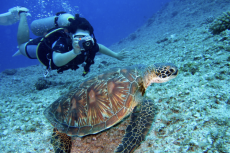Learn what a marine biology education involves, from an Introduction to Marine Biology class to undergraduate and graduate studies.

The ocean is so vast, with so many things to study, that a marine biology career can take many different directions. A few things a marine biologist may do include studying the interactions of certain fish species, analyzing how global warming affects the ocean, and helping manage conservation projects. To pursue these various projects, it’s essential to have a solid marine biology education.
What Does an Introduction to Marine Biology Class Cover?
An Introduction to Marine Biology course is a good way for students to develop their interest in ocean studies and gain a cursory knowledge of what marine biology involves. Courses at different schools will vary, but students will generally learn about the diverse marine ecosystems, various marine species, and ocean circulation. Students may also learn about introductory water chemistry, how waves impact marine life, formulas for population growth, and how humans impact the sea.
Furthermore, marine biology students often need to articulate their research and findings effectively, requiring proficient essay writing skills. Developing strong writing skills is necessary, as students must be capable of constructing clear, coherent, and persuasive essays and research papers. This is where an essay writing service, often discussed among students on platforms like Reddit, can be an example or educational tool. These services provide insight into academic writing standards that can help students learn how to properly structure and present their research, contributing to their overall success in the field.
Looking at an Introduction to Marine Biology syllabus may help students gain a better sense of the class. Online syllabi can be found at Florida International University and Ventura College or schools offering online marine biology courses.
Required Marine Biology Classes for an Undergraduate
It is not required to major in marine biology as an undergraduate to become a marine biologist. A degree in biology, chemistry, or zoology will provide an excellent base for further studies. Students who do decide to pursue a marine biology degree as an undergraduate should expect to study geology, chemistry, physics, and math, including statistics. Although some courses may include field studies on the seashore, students should expect to spend a good deal of time in the classroom and labs. Some colleges require undergraduates to take core classes in English, Art, History, the Social Sciences, and Foreign Languages.
Schools often list the required courses for their marine biology degrees on their websites; try looking at a school website, such as the University of Miami or the University of Texas at Austin, for more information.
Required Marine Biology Courses for Graduate Students
By now, students realize marine biology is science-intensive and may involve more time looking down a microscope than swimming with dolphins. Students will start focusing on their studies – perhaps physical oceanography interests the student more than biological oceanography. As a graduate, marine biology courses could cover fluid dynamics, wave physics, genetics, marine sedimentation, or population dynamics. At this stage, students should start participating in research projects and maybe even consider developing their own.
Check out the course descriptions at undergraduate marine biology schools such as Scripps Institution of Oceanography or the Marine Science and Environmental Studies program at the University of San Diego.
Possible Marine Biology Studies for PhD Students
Many students continue their marine biology education by entering a PhD program. The marine biology PhD prepares students for careers in research and teaching. During this rigorous program, Ph.D. students must complete a thesis that involves original research that adds to science’s body of knowledge and is of publishable quality.
To ensure their research meets the highest academic standards, some students may seek the support of a custom research paper writing service, particularly when they are overwhelmed with the demands of their studies. In addition to thesis work, students will also continue taking courses at the graduate level. Exploring university websites and understanding current research trends is an excellent strategy for those preparing for PhD level marine biology studies and contemplating the vast scope of their future work.
Diving as a Practical Part
In addition to theoretical knowledge, marine biology students are often required to gain practical experience, which may include diving. Diving is integral to marine biology as it allows for direct observation and collection of data in the marine environment. Students will learn diving techniques and safety procedures, often resulting in scuba certification, which enables them to conduct underwater research and engage with aquatic life in its natural habitat. This hands-on experience is vital for a nuanced understanding of marine ecosystems and can shape a student's future research interests and career direction.
Summing Up
In conclusion, a comprehensive marine biology education equips students with a broad base of knowledge and diverse skills, from understanding the intricate ecosystems of the ocean to conducting detailed scientific research. Whether it's through diving deep into the waters to study marine life firsthand or honing the ability to communicate scientific findings through adept essay writing, the journey of marine biology students is as multifaceted as the seas they study.
As these students advance from introductory courses to specialized graduate research, they not only contribute to our understanding of the marine world but also to the preservation of its vast, vital resources. With a solid educational foundation and a commitment to continuous learning and adaptation, graduates of marine biology programs are well-prepared to face the challenges of a changing environment and to make meaningful contributions to the field.





















